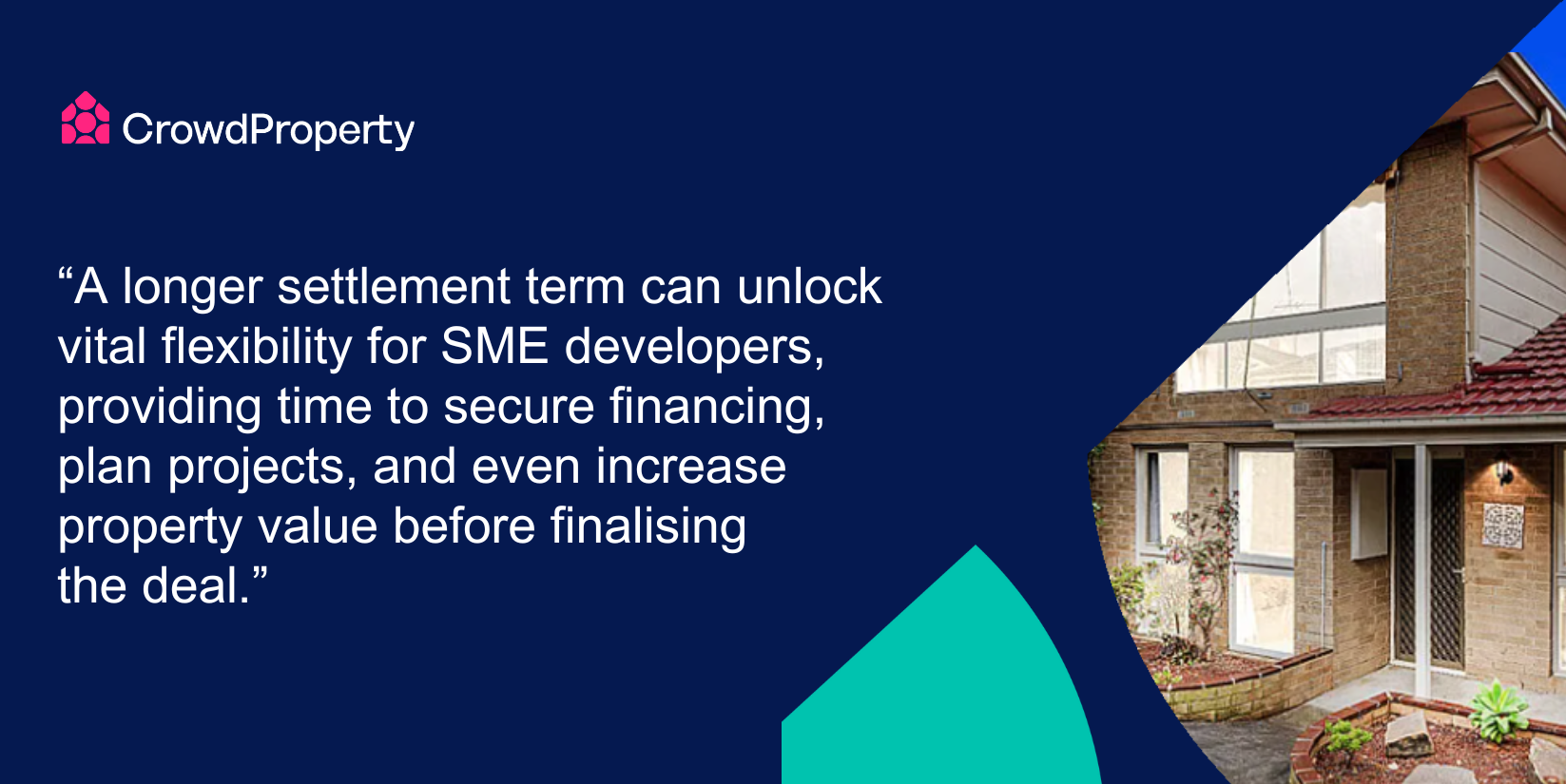
Benefits and risks of longer settlement terms for property investors
Back to Blog 5 November 2024 5 minute read
When it comes to property development, settlement terms play a crucial role in determining the timeline for finalising a purchase and getting started on a new project. While shorter settlements are common, longer settlement terms are increasingly appealing to SME property developers due to the flexibility and potential financial advantages they offer.
This article explores the benefits and risks of longer settlement terms, focusing on why they may be particularly advantageous for SME property developers.
What are settlement terms?
Settlement terms refer to the period between the exchange of contracts and the final transfer of property ownership. This is when the buyer fulfils all contractual obligations — such as securing financing — and the seller prepares the property for handover. Settlement terms are a vital part of any property transaction as they provide the timeline within which both parties must meet their obligations.
Typically, settlement periods last between 30 to 90 days. However, these durations can vary depending on the specific agreement between buyer and seller, and in some cases, they can extend much longer.
What is a long-term settlement?
A long-term settlement extends beyond the usual 30 to 90-day window and can last anywhere from six months to several years. Longer settlements allow both parties to secure favourable conditions, with property developers often negotiating longer terms to buy time for project planning, securing finance, or waiting for market conditions to improve.
Understanding 6-month settlements
A six-month settlement period offers a middle ground between short-term and long-term agreements. It provides developers with additional time to carry out due diligence, gain approvals, or plan their development without the immediate pressure to complete the transaction. Compared to shorter settlement periods, a six-month timeframe can help developers align their project timelines more effectively while mitigating some risks associated with property transactions.
Risks of long settlement terms
While longer settlement terms offer various advantages, they also carry certain risks. These include:
-
Market volatility: Property prices can fluctuate significantly over extended periods. If the market declines, the property may lose value, making the original agreed-upon price less favourable.
-
Financing uncertainties: Securing financing can become more difficult if lending conditions change during a long settlement period, especially if interest rates rise or lending standards tighten.
-
Changes in personal circumstances: Both buyers and sellers are exposed to the risk that their personal or financial circumstances may change, potentially affecting their ability to complete the transaction.
To mitigate these risks, developers can negotiate flexible terms, such as contingencies in case of market shifts or financing delays, or seek legal advice to safeguard their interests.
Advantages of long settlement terms
Despite the potential risks, long settlement terms can offer significant advantages, particularly for property developers. Here are four key benefits:
Vendors become more flexible
In a down market, vendors are often more open to negotiation on settlement terms. This can allow developers to secure longer periods to finalise their financing, conduct site evaluations, or get planning approvals. Vendors may even allow early access to the property, enabling developers to begin groundwork before the settlement is finalised.
Upsides for all
Longer settlement terms can create a win-win situation for both the vendor and the buyer. For developers, this means securing a property without the immediate financial burden of finalising the deal. For vendors, it provides the certainty of a locked-in price, which is particularly attractive in volatile markets. Additionally, vendors may benefit from having time to sort out their affairs, such as finding a new home or managing financial obligations.
Doing the numbers
From a financial perspective, a longer settlement term allows developers to invest less cash upfront. For example, instead of the standard 10 percent deposit, a developer might negotiate a lower deposit, such as four percent, while extending the settlement term to six months. This provides additional liquidity and flexibility to pursue other deals. If the developer gains planning approvals or a development certificate during this period, the property could increase in value before the settlement, further improving the developer’s financial position.
Other benefits
Longer settlement terms can offer other practical advantages, such as delaying interest payments and stamp duty (check with your local state revenue office) until the settlement is finalised. Developers can use this time to get their project ‘shovel-ready’ without incurring immediate costs. Additionally, in a market where supply chains are strained and tradespeople are in high demand, longer settlement terms give developers more time to secure contractors and materials at more favourable prices.
Support your property development projects with CrowdProperty
CrowdProperty understands the unique challenges and opportunities that longer settlement terms provide for SME property developers. With a focus on providing flexible financing options, CrowdProperty empowers developers to take advantage of these extended terms, allowing you to plan your projects effectively and maximise your return on investment. Whether you’re negotiating flexible settlements or seeking finance to kickstart your next project, CrowdProperty is here to support you.
